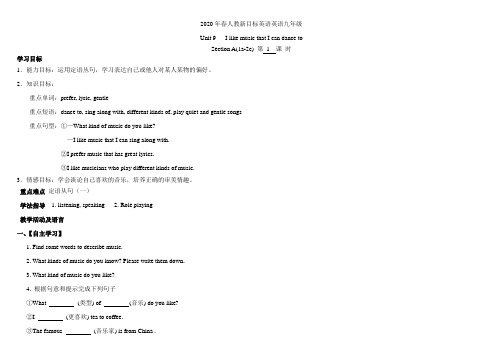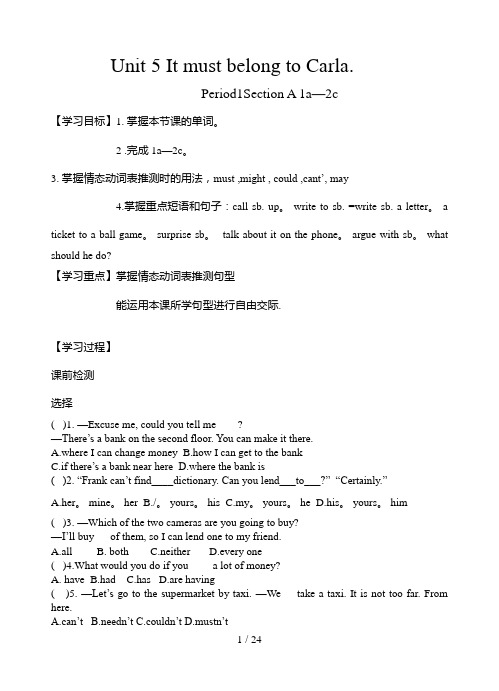Grade 9 Unit9 导学案
- 格式:doc
- 大小:45.50 KB
- 文档页数:2

2020年春人教新目标英语英语九年级Unit 9 I like music that I can dance toSection A(1a-2c) 第1 课时学习目标1.能力目标:运用定语丛句,学习表达自己或他人对某人某物的偏好。
2.知识目标:重点单词:prefer, lyric, gentle重点短语:dance to, sing along with, different kinds of, play quiet and gentle songs重点句型:①—What kind of music do you like?—I like music that I can sing along with.②I prefer music that has great lyrics.③I like musicians who play different kinds of music.3.情感目标:学会谈论自己喜欢的音乐,培养正确的审美情趣。
重点难点定语从句(一)学法指导 1. listening, speaking 2. Role playing教学活动及语言一、【自主学习】1. Find some words to describe music.2. What kinds of music do you know? Please write them down.3. What kind of music do you like?4. 根据句意和提示完成下列句子①What (类型) of (音乐) do you like?②I (更喜欢) tea to coffee.③The famous (音乐家) is from China .④Carmen likes music that has great (歌词).二、【合作探究】(一)看课本1a-2c小组合作讨论,将下列词组配对并完成1a。
1. dance to 随着……唱2. sing along with 优美的歌词3. quiet and gentle songs 伴着……跳舞4. different kinds of music 安静轻柔的歌曲5. great lyrics 不同种类的音乐(二)听读说写训练1.听录音,完成1b并试着重复句子。

人教版新目标九年级英语教案Unit9第九单元教学设计第一篇:人教版新目标九年级英语教案Unit 9第九单元教学设计人教版新目标九年级英语教案Unit 9第九单元教学设计 AUnit9 I like music that I can dance to(第1课时)一、教材分析定语从句是本单元的语法要点,是在1-8单元已经对该语法知识有所渗透的前提下安排的。
本节课话题是让学生体会音乐在生活中无处不在,体会不同类型音乐的特点,学会热爱生活;能用简单的定语从句形式表述自己的观点。
通过本节的学习,增强学生对复合句的理解,提高其对此句式的应用能力。
二、学生分析学生们已经有了初步的复合句的知识。
三、三维目标1、知识目标:掌握本单元基本词汇,学会恰当的使用引导词that ,who2、能力目标1)掌握功能句“What kind of music do you like ? I like music that I can dance to.I love singers who can write their ownmusic.”2)能够自如地谈论自己所喜欢的音乐和音乐家。
3、情感目标:通过学生谈论对音乐和音乐家的好恶,从而使学生学会欣赏音乐的美。
四、教学重点1)本节课的教学重点是学会并掌握先行词为物或者人时,引导词“that ,who ”的使用方法。
2)“prefer …to…”的用法3)掌握有关音乐的词汇和相关的词组,能够比较流利地描述自己喜欢的音乐,运用功能句“What kind of music do you like ? I like music that I can dance to.I love singers who can write their own music.”五、教学难点定语从句运用六、教学策略采用任务型语言教学,实施情境教学法、小组合作探究法、情感激励法。
七、教学准备自制多媒体课件(PowerPoint);录音机(A tape recorder)八、教学环节1、课堂导入⑴ Warming up ⑵ Discuss: Do you like music? What kind ofmusic do you know? ⑶ There aremany kinds of music such as pop ,jazz, rock…….Let Sstalk about the kinds of music..(多媒体出示)⑷Let Ss read 1a.Explain the sentences: I prefermusic that has great lyrics=I like music that has great lyrics better.lyrics:the plural form is often used.Ask Ss topractice in pairs then make up a short passage using the four sentences on thescreen.2、课堂讲授Explain attributive clauses.定语从句:在复合句中修饰名词或者代词的从句叫做定语从句。

Unit 5 It must belong to Carla.Period1Section A 1a—2c【学习目标】1. 掌握本节课的单词。
2 .完成1a—2c。
3. 掌握情态动词表推测时的用法,must ,might , could ,cant’, may4.掌握重点短语和句子:call sb. up。
write to sb. =write sb. a letter。
a ticket to a ball game。
surprise sb。
talk about it on the phone。
argue with sb。
what should he do?【学习重点】掌握情态动词表推测句型能运用本课所学句型进行自由交际.【学习过程】课前检测选择( )1. —Excuse me, could you tell me____?—There’s a bank on the second floor. You can make it there.A.where I can change moneyB.how I can get to the bankC.if there’s a bank near hereD.where the bank is( )2. “Frank can’t find____dictionary. Can you lend___to___?” “Certainly.”A.her。
mine。
herB./。
yours。
hisC.my。
yours。
heD.his。
yours。
him( )3. —Which of the two cameras are you going to buy?—I’l l buy___of them, so I can lend one to my friend.A.allB. bothC.neitherD.every one( )4.What would you do if you ____a lot of money?A. haveB.hadC.hasD.are having( )5. —Let’s go to the supermarket by taxi. —We___take a taxi. It is not too far. From here.A.can’tB.needn’tC.couldn’tD.mustn’t( )6. “My I try on the jeans?” “Yes, you_____”A. shouldB.canC.mustD.need( )7. When traffic lights are red, we___stop and wait.A. mayB. canC.mustD.might( )8.You have already tried your best, so you____worry about the matter.A.can’tB.needn’tC.mustn’tD.couldn’t( )9.---Are you going to buy a camera?---Yes. but there are so many kinds that I can’t decide___to buy.A.whatB.whichC. howD.where( )10. ____fathers are both scientists.A.Jim’s and BobB. Jim’s and Bob’sC. Jim and Bob’sD. Jim and BoHomework二. 自主学习,学习任务一:熟练掌握本节课的词汇。

九年级英语上导教案Unit 9I like music that I can dance to.课题Unit 9Period 1 1a-2c课型听闻课1.知识目标:1)单词: prefer,lyrics ,Australian,electronic2)词组: prefer to ; dance to ; electronic music; sing along with .3)句型:A. 表达咨询种类 :--what kind of music do you like?学习目标--what kind of musicians does Carmen like?B.表达独爱 :---I prefer music that has great lyrics.---I like music that I can sing along with.---I like music that I can dance to.2.技术目标:能听懂本课时所放的听力资料,并能说出重要句型。
学习要点掌握 Section A 1a-2c全部要点单词,短语和句型。
(1)运用定语从句,学习表达自己或别人对某人或某物的偏好。
学习难点(2)初步认识宾语从句的观点,关系词的运用。
学习过程自主空间一、独立自主学习 (5 ′)一)翻译以下词组。
1. sing along with2. dance to3 electronic music________4. too loud________________5.prefer to 6 有歌词的音乐7.弹不一样种类的音乐8.柔和而舒缓的音乐9.写他们自己的歌词10.最喜爱的乐队二)议论T: Prepare some pieces of difficult music and play it .Then name them before asking the questions:1.Do you like music? Which do you like better, loud music or soft music?2 .What kind of music do you like?Why?二、合作互帮学习任务一:读句子I prefer music that has great lyrics.I love music that I can sing along with.I like musicians who write their own songs.小组沟通,议论:修饰 __________的句子叫定语从句 . 被定语从句修饰的名词或代词叫 _______. 连结定语从句的词叫____. 假如先行词是人 , 用___连结 ; 假如先行词是物 , 用___连结 . 假如关系词在从句中做___ , 能够省略 . 假如关系词在从句中做___, 不可以___ , 从句中谓语动词与____保持一致任何二:议论关系代词 that who任务三:用 that 或 who 达成句子。

Unit 9 When was it invented?第一课时年级:九年级学案学科:英语课型:New主备人:张菲班级 ________一.学习目标:1.知识目标:1 . Words and phrases 2. Talk about the history of inventions2.能力目标:能在具体语境中正确运用被动语态。
3.情感目标:了解中国古代四大发明,培养爱国主义精神。
二.学习重点:重点词汇用法及被动语态用法。
学习难点:被动语态各种时态的构成。
三.学习过程:(一)预习导学:Talk about the invention time of some things.(二)自主学习:2a 2b.(三)合作探究:Make a list of five helpful inventions and five annoying inventions.(四)梳理归纳:被动语态1.被动语态的时态: 被动语态的时态通过be的变化来体现,它必须与主语的人称、数一致。
以下是几种常用的被动语态:(1)一般现在时的被动语态: am / is / are + 动词的过去分词。
Eg:This book in two languages.这本书是用两种语言写的.(2)现在进行时的被动语态: am / is /are + being + 动词的过去分词。
Eg: A school is by the workers now.工人们正在建一所学校.(3) 一般将来时的被动语态: will / be going to + be + 动词的过去分词.Eg: The project will next month.这项工程下个月就完工.(4) 现在完成时的被动语态: have / has + been + 动词的过去分词.Eg: My homework .我的作业以完成了.(5) 一般过去时的被动语态: was / were + 动词的过去分词.Eg: The classroom three days ago. 教室是三天前被打扫的.(6) 含有情态动词的被动语态: 情态动词 +be +动词的过去分词.The classroom every day.教室应该每天都被打扫.2.被动语态的否定句和疑问句:(1)否定句的构成:必须在第一个助动词后加not。

导学案第一课时Section A (1a~1c)【学习目标】1.教会学生掌握单词prefer,Australian,electronic,suppose,smooth,spare,director,case,war。
2.指导学生仔细聆听谈论自己喜欢的音乐的对话;学会用定语从句谈论自己的喜好。
3.引导学生通过开展小组学习活动,培养协作意识;学会谈论自己喜欢的音乐,培养正确的审美情趣。
【学习重点】重点单词:prefer,Australian,electronic,suppose,smooth,spare,director,case,war【学习难点】通过交流表达和听力训练,引入各种学习方法和策略来学习定语从句。
情景导入生成问题T:Do you love music? Yeah,music is also my favorite.It makes my life more colorful.You know,thereare different kinds of music in the world.自学互研生成能力一.I can write.(我会写)翻译下列词语:(1)great lyrics (2) 跟着歌唱(4)in that case (3) too loud(5)随之跳舞(6) full of energy二、I can practice.(我会练)1.用适当的关系词填空。
(1)Carmen likes musicians play different kinds of music.(2)Carmen likes electronic music is loud.(3)Xu Fei prefers musicians write their own songs.(4)I prefer movies give me something to think about.(5)The subject ________I like best is English.(6)The man ________teaches us English is Mr Black.(7)He likes stories _______are sad.(8)The woman ______is the most important in my life is my mother.2. 单项选择()1. —Can you dance______the music?—Yes, I can. It’s easy.A. withB. inC. atD. to()2. —How wonderful the music is! Let’s try to sing along ______it.—That sounds good.A.toB. withC. forD. On()3 .Everyone ______has been to Shanghai says it is a modern city.A. whyB. whoseC. whoD. which()4. Lucy loves singers______are creative and energetic.A. whichB. whoC. whomD. What()5.The action movie______I saw last week is really exciting.A. whenB. whoC. thatD. What6. I like friends ______are friendly and out-going.A. whoseB. whatC. whoD. Which3.把简单句改为定语从句。
Unit 9 I like music that I can dance to.课时分解§自主学习方案 【新词自查】根据句意及首字母提示完成句子。
1.Beethoven was one of the most famous musicians in the world.2.The lyrics of the song are very beautiful and sound like poems.3.Which do you prefer, classical music or pop music?4.Fong Xiaogang is a famous Chinese director, I like watch his movies.5.I suppose that Alice may like the electronic music. §课堂导学方案Step 1情景导入 参考案例Teacher :Do you love music? Yeah,music is also my favorite.Itmakes my life more colorful.You know,there are different kinds of music in the world.(Play some beautiful music and get Ss to talk about it freely.)Teacher:What kind of music do you prefer? Students:_______________________①I like loud music.I can dance to it. ②I like quiet music.Present some new words and the attributive clause at the same time.(4分钟)环节说明:通过课前的一个师生问答互动引入新课的话题,美妙的音乐也把同学们带入了一个美好的意境,学习兴趣不言自明。
Unit 9 I like music that I can dance to.Part One (Section A 1a ---- 2d)一、课前自学(3min)1. 完成课本第65页1a的练习。
2. 翻译完成下列短语。
跟着唱美妙的歌词不同种类的音乐安静舒缓的歌电子音乐悦耳的音乐在一周的工作后既然那样思考空闲时间二、探究、展示(25min)1.要求学生翻开课本P65,迅速阅读1a部分的内容。
并按要求完成课本上相应的任务。
2.核对答案,先要求全班一起给出答案并检查讨论。
然后要求2-3名同学就“I like music that ”给出自己的答案并完成课本上1b的听力任务。
4.要求学生听第二遍录音,并逐句进行跟读。
5.完成教材1c的任务,要求学生模仿听力内容,使用“—What kind of music do you like?—I like music that …”进行对话练习。
并邀请2-3对同学当堂进行演示。
6.要求学生翻开课本P66。
要求学生迅速捕捉图片和文字信息,然后为他们播放第一遍录音,完成2a,2b的听力任务。
7.要求学生听第二遍录音,并逐句进行跟读,教师应作必要的听力和朗读指导。
8.两人一组大声朗读听力材料。
(1分钟)9.播放2d的对话录音,让学生跟读,模仿并理解大意。
然后让学生分角色朗读并表演2d的对话。
三、点拨(7min)定语从句:1. 定义:在复合句中,修饰某一名词或代词的从句叫定语从句。
定语从句通常置于它修饰的名词或代词之后,被修饰的名词或代词叫先行词。
2. 连词:引导定语从句的连词分为两类,关系代词:that, which, who, whom, whose. 关系副词:when, where, why. 连词在句中起连接作用,同时又代替先行词在从句中充当句子成分。
prefer v. 宁愿,更喜欢其用法如下:1.prefer + 名词/动名词I prefer staying at home during the holiday. 假期期间,我比较喜欢待在家里。
学习目标: 1.学习表达喜爱; 2. 学习用that, who and which引导的定语从句;第一课时Unit 9 Section A 1a-2d (p65-66)【单词检测】1 更喜欢2 歌词3 澳大利亚人的4 电子的5 推断,料想6 悦耳的,平滑的7 空闲的8 导演9 情况,实情10 既然那样11 战争【课前预习】一、找出下列词组/句子并在课本上作标注:(1a—2a)1 跟唱2 随之跳舞3 有优美的歌词4 演奏不同种类的音乐5 演奏慢柔的音乐________________________6 电子音乐7 自己写歌8我最喜欢的乐队三、找出词组并在课本上作标注:(2d)1 帮助我放松2 在一个长周之后3 听起来不错4 有空闲的时间5 想太多6 既然那样______________________________________7 取决于8 给我一些思考的东西【课堂重难点突破】一、prefer:(动词)更喜欢---preferring; preferred(1) prefer sb./sth.(to sb./sth.):(与……对比)更喜欢某人/某事(熟记)(2)prefer doing sth. to doing sth. :与做某事对比,更喜欢做…. (熟记)(3)prefer to do sth. rather than do sth. :宁愿做……而不愿……=would do sth. rather than do sth. = would rather do sth. than do sth. (熟记)1. 与民俗音乐相比,我更流行音乐。
I _______________ pop music _________ folk music.2. 越来越多年轻人更喜欢骑单车,而不喜欢乘坐公共汽车。
More and more young people _________________________ bikes __________________ a bus.3. 周末,她宁愿呆在家里,也不愿意跟朋友去运动。
九年级英语 Unit 9复习提升课导学案时间:2011-01-10 08:16 发布人:王宏伟点击:580次安阳市殷都育才中学九年级英语导学案一、【复习目标】:1、巩固本单元重点单词及词组:bulb; light bulb;microwave;be used for; be invented by;see in the dark;by accident;according to;fall into;in this way; in the end.2、能用经典句型谈论某物品发明的时间、发明人及其用途。
3、通过对世界上一些重要发明的了解增强自己的爱国情感并激发学习动力。
二、【教学重点、难点】:掌握各种时态的被动语态及含有情态动词的被动语态的结构。
三、【复习流程】自主学习,参考课本,挖山寻宝,找出重难点,疑惑之处采用对学、群学,在寻找的过程中强化文本、温故知新,并熟读之。
(一)词汇拓展:1.发明;创造v. _________→_________n.发明→_________n.发明家2.咸的;含盐的adj. _________→_________n.盐3.投;掷v.__________→_________(过去式)→_________(过去分词)4.发展v. _________→_________发展n.→_________发展中的adj. →_________adj.发达的5.上升v. _________→_________(过去式)→_________(过去分词)(二)重点词组:1.电灯泡__________2.用来做……___________3.微波炉____________4.整天___________5.错误地_________6.这样___________7.偶然地__________8.根据__________9.足够咸___________(三)词语辨析1.be used for, be used to2.in the end, at the end of, by the end of,finally,at last3.invent, discover4.in this way,in the way,on the way(四)重点句型:1.-When was the car invented? -It was invented in 1885.2.-When were electric slippers invented? -They were invented last year.3.-Who were they invented by? -They were invented by Julie Yhompson.4.-What are they used for? -They’re used for seeing in the dark.(一)读表格,填写下列各个时态的被动形式(give为例):2组展示(二)小组对抗赛每组先在本组内找出自己认为有难度的题,也可以是对话或画,然后写到本组的黑板上,各组找对抗方,最后评出优胜组。
Grade 9 Unit9 导学案学习目标:1.初步掌握单词的读音,词义。
2.初步掌握单词的基本用法。
重点:单词的读音、词义,固定搭配。
难点:单词的词义,语法点。
预习案使用说明&用法指导1.预习时,试读每一个单词,在读单词的时候注意词义。
2.完成时间30分钟。
预习unit9单词,完成下列英译汉&汉译英1)发明;创造v.___________ 21) 敲,撞v.____________2)用来做......____________ 22) 分开,划分v.__________3)可调整的adj._____________ 23) 目标,目的n.__________4)操作,作业v._____________ 24) 低于,在....的下面_________5)加热,使变热v.____________ 25) 发展,完善,使成长v.________6)错误的______________ 26) 普及,流行n.______________7)厨师n._________________ 27) scoop ___________8)偶然地,意外地_____________ 28) heel ___________9)根据,按照_________________ 29) battery ___________10)古代的,古老的adj.___________ 30) light bulb ___________11)传奇,传奇故事n._____________ 31) crispy ___________12)落入,陷入__________________ 32) bakery___________13)留下,剩余,保持v.______________ 33) binoculars_________14)生产,制造v.__________________ 34) metal ___________15)舒适的,令人愉快的adj.____________ 35) guide ___________16)这样_______________ 36) worldwide ___________17)味道,风味n._______________ 37) association ___________18)世纪,百年n._______________ 38) equipment ___________19)顺序,级别n._______________ 39) slipper___________20)创造,创作v.________________ 40) microwave___________探究案1.invent[ɪn'vent] v. 意为____________,过去式和过去分词均为拓展:发明,发明物n.___________ 发明家n.______________sb. invent sth. 某人发明某物sth. be invented by sb. 某人被某物发明① We must invent an excuse for our absence.英译汉:_________________________________________________________② Kites were invented by the chinese people over 2000 years ago.英译汉:_________________________________________________________动动脑筋◎◎辨析:invent & discoverEg: Columbus _________ America but he did not explore the new continent.哥伦布发现了美洲,可是他没有去探索这个新大陆。
Edision __________the electric light bulb. 爱迪生发明了电灯泡。
2.be used forbe used for doing sth√. be used to do sth.√被用来做某事①This computer ______________control all the machines. 这台电脑是用来控制所有机器的。
②W ood can _________________ making paper. 木头可以被用来制作纸张。
拓展延伸☆use的其他用法√used to do sth. 过去常常”,表示过去的习惯、经常发生的动作或状态。
He _______________ a teacher in our school. 他曾经是我们学校的一位老师。
√be used to doing sth. “习惯于做某事”,其中to是介词,后接名词或动名词。
_______ she _____________walking after supper? 她习惯晚饭后散步吗?√be used as…意思是“被用作为”This grammar book______________ a textbook. 这本语法书可被用作教科书来用。
3.by mistake & by accidentby mistake 错误的,意外的,是更强调是无意识犯的错(带有主观色彩)by accident 意外的(无主观意识,很客观的意外)Eg: I took away his book _____________.我错拿了他的书。
I met Lilei at the park _____________. 我在公园偶遇见李磊。
4. i n this wayIn this way这样,用这样的方式The work should be done _______________. 工作应该这样做。
拓展延伸☆way 的其他用法√ in the way & on the way & by the wayHer social life got________ of her studies.她的社会活动妨碍了她的学习。
Let's wait a few moments. He's ____________.咱们等一会儿,他正在路上。
________________, has everybody arrived? 附带问一句,大家是否都到了?5. 被动语态(1)被动语态表示句子的主语是谓语动词所表示的动作承受者。
(2)被动语态基本结构:be+及物动词的过去分词(如果是不及物动词,其过去分词应带有相应的介词)(3)被动语态中的be 是助动词,有人称、数和时态的变化。
一般现在时的被动语态为:am/is/are+过去分词一般过去时的被动语态为:was/were+ 过去分词与情态动词连用的被动语态:情态动词+ be + 过去分词(4)被动语态中动作的发出者或执行者做介词by的宾语,放在句末,by 表示“由,被”的意思.Eg:Many people speak English. → English ______________many people.Mr Bush took some photos in Paris.→_________________________The police could catch the thieves.→____________________________训练案一、用括号内所给动词的正确形式填空。
(请注意时态和语态两个方面噢)1.It's said that the long bridge______________(build)in two months.2.Where to have the meeting ______________ (discuss)now.3.Which language _______the most widely_______(speak)in the world?4.The lost boy_____________(not find)so far.st year a large number of trees______________(cut)down.6. The students _____ often _____(tell) to take care of their desks and chairs.7. The old man is ill. He ______ (must send) to the hospital.8. Vegetables, eggs and fruits_________ (sell) in this shop.9. What _______ knives ______ (make) of ?They_______________(make) of metal(金属) and wood.10. Can the magazine ________ (take) out of the library?二、下列各句均有一处错误,请找出并改正过来。
①I have a lot of homework to be done tonight.____________②Is your history teacher listened carefully in class?____________③Lei Feng's name remembered by all Chinese people.____________④The music is sounded beautiful. ____________⑤By who was this new educational CD-ROM designed ? _____________ 开心一笑ѺѺA Fishy StoryTwo avid fishermen go on a fishing trip. They rent all the equipment: the reels, the rods, the wading suits, the rowboat, the car, and even a cabin in the woods. They spend a fortune.The first day they go fishing, but they don't catch anything. The same thing happens on the second day, and on the third day. It goes on like this until finally, on the last day of their vacation, one of the men catches a fish.As they're driving home they're really depressed. One guy turns to the other and says, "Do you realize that this one lousy fish we caught cost us fifteen hundred dollars?"The other guy says, "Wow! It's a good thing we didn't catch any more!"。